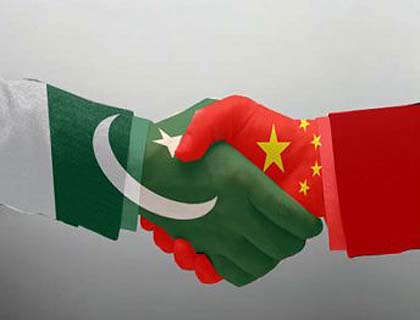Exclusive for the Daily Outlook Afghanistan
All elements of the budding Chinese-Pakistani alliance as a strategic, long-term counterweight to the U.S. and India are now in place. This can be seen in two trends: the unprecedented bolstering of China-Pakistan relations in military and economic spheres; and the deepening rupture in Pakistan-U.S. relations in the wake of the killing of Osama bin Laden in a unilateral U.S. operation that was seen as violation of Pakistan's sovereignty and national dignity.
During his visit to Beijing in May, Pakistani Prime Minister Yousuf Raza Gilani stated that Pakistan is determined to take all necessary measures for economic integration with China, adding: ''Pakistan will always and under all circumstances support and defend the just cause and core interests of the Chinese nation.'' During his April 16, 2011 visit to Kabul, Prime Minister Gilani had also advised President Hamid Karzai that the U.S. has been defeated in the region, and it is better for Pakistan and Afghanistan to prefer China as a strategic ally, according to a report in the Pashtu-language daily Khedmatgar Wrazpanra of April 30.
It is clear that Pakistan is seeking to define its interests in Afghanistan and elsewhere in opposition to the U.S. and India. Commenting on Pakistani leaders' visit to Kabul, Afghan political analyst Sulaiman Layaq remarked that the ''Pakistani government supposes Afghanistan as a Pakistani colony,'' according to a report on the Afghan website shamshadtv.tv. During the Kabul trip, Prime Minister Gilani had also asked the Afghan president to recruit – unbelievably – Pakistani officials in Afghan government institutions.
Pakistan's strategic moves are being steered by Salman Bashir, who is – according to a report in The Express Tribune of April 28 – a ''strong advocate of seeking realignments and has presented a detailed analysis to the government regarding a reduction in dependence on the U.S. by reaching out to the Chinese.'' Gilani's China visit was planned in advance to mark the 60 years of Pakistan-China relations, but its strategic importance grew in the wake of bin Laden's killing. Chinese leaders also assured Gilani of unflinching support to Pakistan. China agreed to ''immediately'' provide 50 JF-17 Thunder jets to Pakistan. This is because Pakistani leaders are worried that in future the U.S. can carry out a unilateral operation against the Pakistani nuclear installations.
In Beijing, Jia Qinglin, Chairman of the powerful Chinese People's Political Consultative Conference, told the Pakistani delegation that Pakistan will never be left in the lurch, assuring: ''No matter how the global situation may change, the resolve and determination of the government and the people of China in developing its friendly relations with Pakistan will never be swayed.''
China has also told the U.S. that any unilateral strike in Pakistan like the one killing bin Laden will be deemed as an attack on China. According to a report in The News of May 19, ''China has warned in unequivocal terms that any attack on Pakistan would be construed as an attack on China... Beijing has advised Washington to respect Pakistan's sovereignty and solidarity.'' During his meeting with Gilani, Chinese Premier Wen Jiabao revealed that Foreign Minister Yang Jiechi delivered the Chinese warning to the U.S. during the U.S.-China talks in Washington in mid-May. After the Abbottabad operation, Pakistani media reported that the U.S. had allegedly jammed the Pakistani radars.
In view of this, China agreed to supply Pakistan with latest radar systems and satellite technologies. Pakistan also requested China to build a naval base at Gwadar. China is supporting Pakistani nuclear reactors, enabling them to fulfil a Pakistani strategy to build low-yield nuclear weapons. In May, the Pakistani cabinet approved a proposal to buy six submarines from China. Chinese troops present in Gilgit Baltistan and in Pakistani Kashmir are now engendering a joint Chinese-Pakistani threat to the security of India. Lieutenant-General K. T. Parnaik, Commander of the Indian Army's Northern Command (which oversees Kashmir), has warned against the Chinese-Pakistani ''deep collaboration in weapon delivery.''
While all countries are free to forge international alliances and protect their national interests, the Pakistani drive to fortify a Chinese-Pakistani military alliance is driven by the fact that Pakistani military is unwilling to abandon its use of militant organizations to further its foreign policy objectives in Afghanistan .

